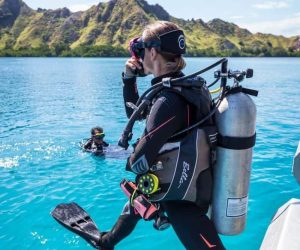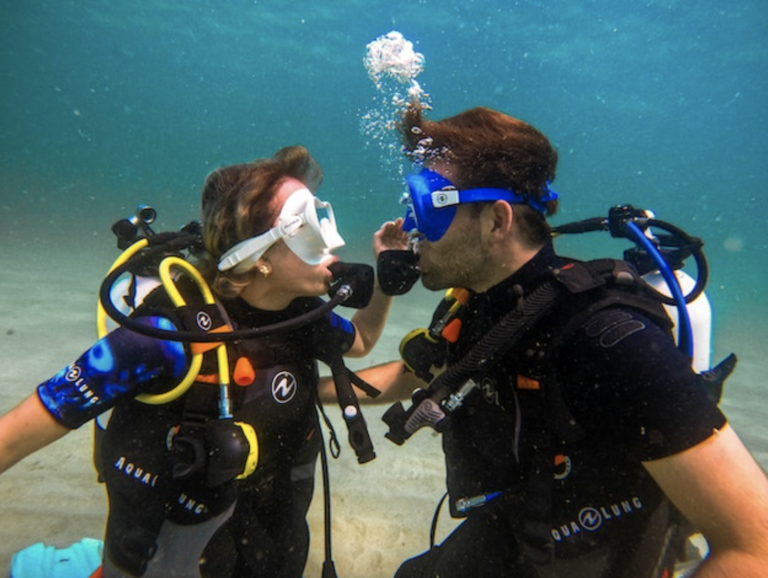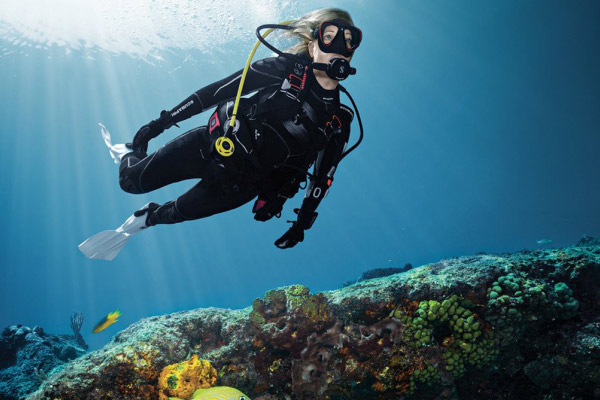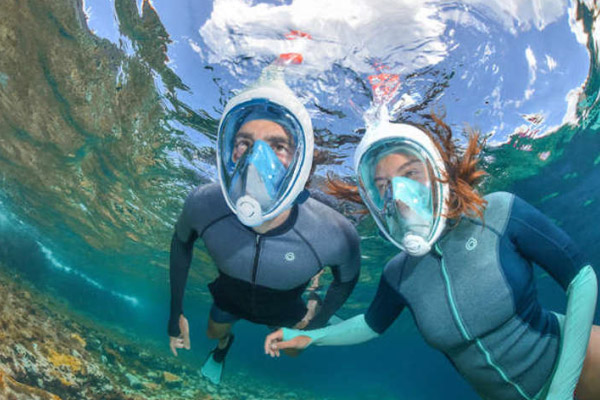Do you want to dive for the first time, but the thought alone makes you nervous? Then this guide was made for you! In this diving guide for beginners you will find everything you need to know to familiarize yourself with this sport and understand that it has what it takes to be your great new hobby.
The underwater world is inhabited by thousands of species of marine plants and animals. So when you practice the diving, it is possible to come across the most incredible landscapes, exotic fauna and flora, aquatic plants and other beauties.
If you are one of those adventurous souls and are not content to observe marine life only on TV, then don't waste any more time and come dive into this fascinating and unique world. Check out!
Contents
Diving options for beginners
Let's start the content with the diving options available for beginners, so that you can get to know them better and conclude which one is best for you.
1. Baptism Dive
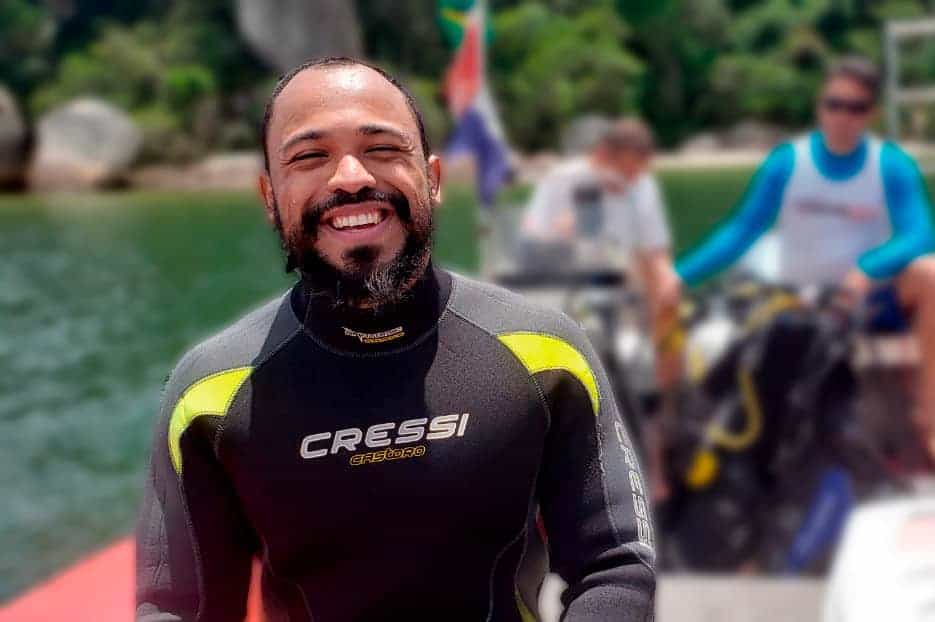
Those who dream of scuba diving, however, have no experience in the subject, have the possibility of getting to know the underwater world through baptism diving.
That kind of diving for starters is aimed at people who have never taken a diving course, or even never dived in life, not even needing to know how to swim.
This is because the activities are carried out in suitable places for beginners and, of course, with the assistance of a trained professional.
Practically anyone over 10 years of age can take the baptism dive.
In this modality, the instructor carries out a brief training, with the main information necessary for the practice of the diving safely and so that you can make the most of this experience.
The equipment that the diver will need is usually offered by the dive operators themselves, such as flippers, mask, pressure and depth regulator, vest balancer, cylinder with air, among others.
Depending on the water temperature of the place, the diver can also use neoprene clothing, designed to prevent the body from losing heat.
In baptism diving, divers can reach a depth of up to 12 meters deep, which is already more than enough for the practitioner to be enchanted by the marine life.
The Ikigai Experience offers several diving experiences.
2. Discovery Scuba Diving
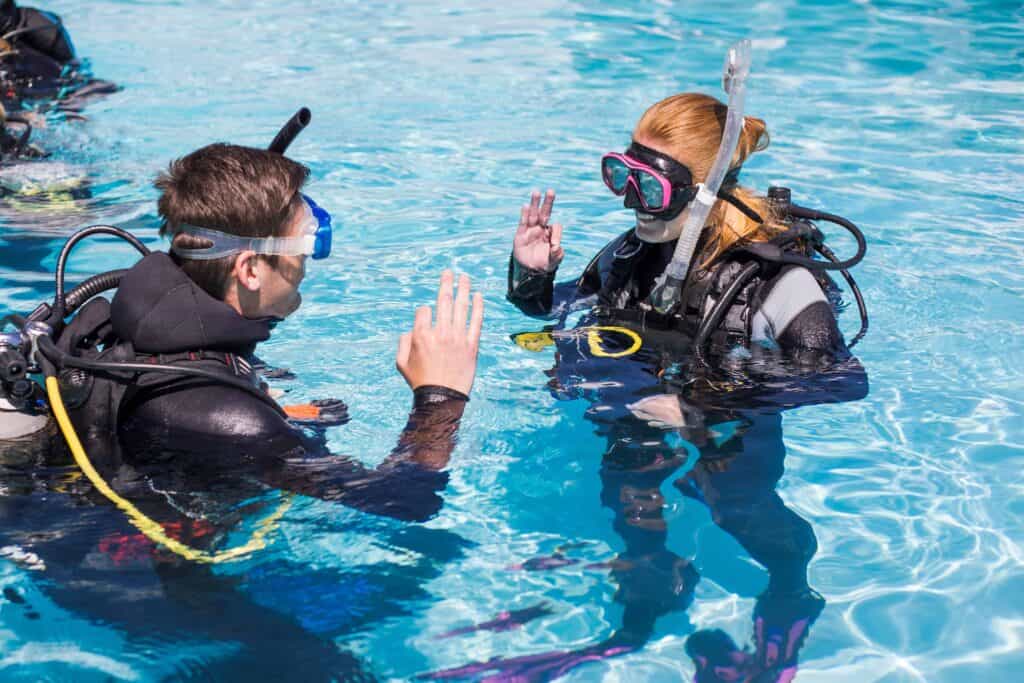
another type of diving for beginners and the Discovery Scuba Diving, an introductory scuba diving program, being one of the most popular and flexible on the planet.
The program is offered by PADI certified operators, one of the most respected certifiers in the world, being one of the references when it comes to diving.
This modality is perfect for those who also have no experience in diving, don't feel it's time to dive in a certification course, but are looking for a fast but immersive diving experience.
One professional PADI qualified person will be in charge of providing a detailed and brief summary on underwater communication, effects due to water pressure, operation of diving equipment and safe practice of the activity.
A great advantage of this modality also stems from the fact that the learnings can be used as credits for the PADI Open Water Diver course.
Discovery Scuba Diving is normally carried out in two diving sessions.
The first session of the program deals with the practice of diving in a pool, where the student will learn to breathe through the regulator and to swim with the equipment more efficiently.
In addition, the beginner will learn certain skills that are taught in the basic diving course.
In the second session, the practice usually takes place at sea, in places suitable for beginners and respecting the maximum depth of 12 meters
In this program, the student ends up acquiring more autonomy when diving, unlike baptism, where the practitioner dives with the full support of an instructor.
3. Bubblemaker Dive Program
For the little ones, PADI schools and operators can still offer the Bubblemaker Dive Program.
This is a program aimed at children, from 8 years of age, with the objective of enabling the introduction of the little ones in the world of diving.
The Bubblemaker can be performed both in swimming pools and at sea, respecting a maximum depth of only 2 meters deep.
With no prior experience or training required, the Bubblemaker program is sure to be fun for kids and families alike.
4. Diving course for beginners
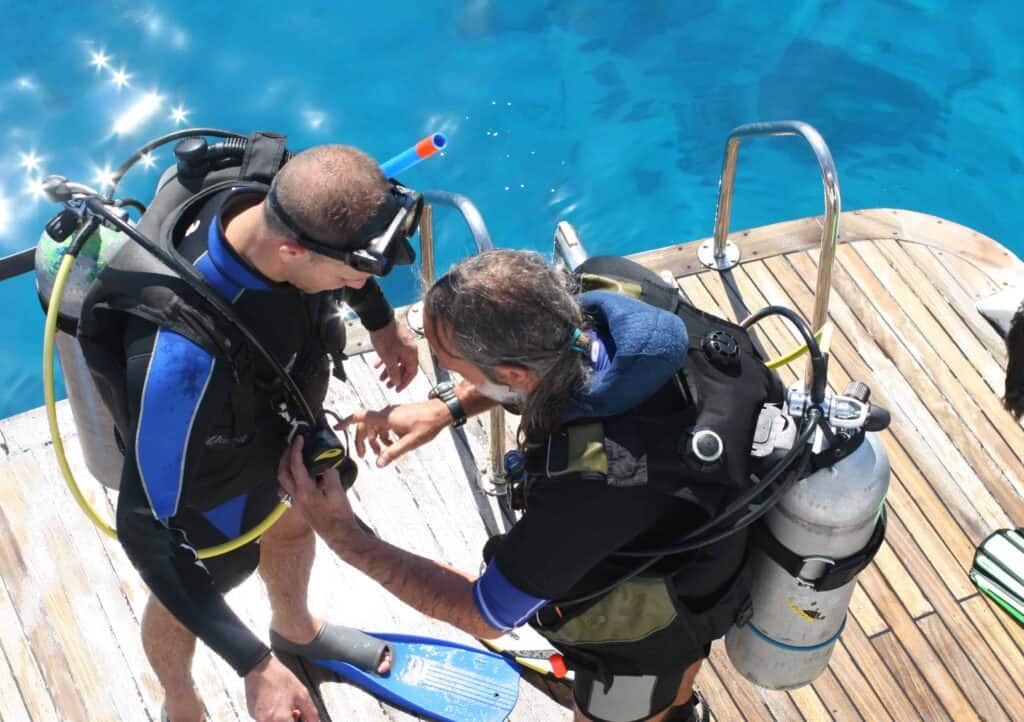
The beginner diver also has the possibility of taking a course, where he will learn everything he needs to know to practice scuba diving safely.
Unlike what happens with baptism diving, where only the most basic instructions are transmitted to the practitioner, in the diving course the student goes through a trajectory involving 3 important stages before receiving the certification. See each of them below.
4.1 Theoretical classes
Theoretical classes are usually given through teaching materials that are prepared by the diving certifier that the school adopts.
In this stage, the student learns the basic concepts of diving related to equipment, techniques, among others.
4.2 Practical classes in a swimming pool
After the theory, it's time for practice, which is initially carried out in a swimming pool.
Classes are supported by instructors, being the ideal time for students to learn how to assemble and disassemble equipment, among other techniques.
At the end of the practical classes, the student will certainly feel more familiar with the activity and, consequently, more prepared to face diving in the sea.
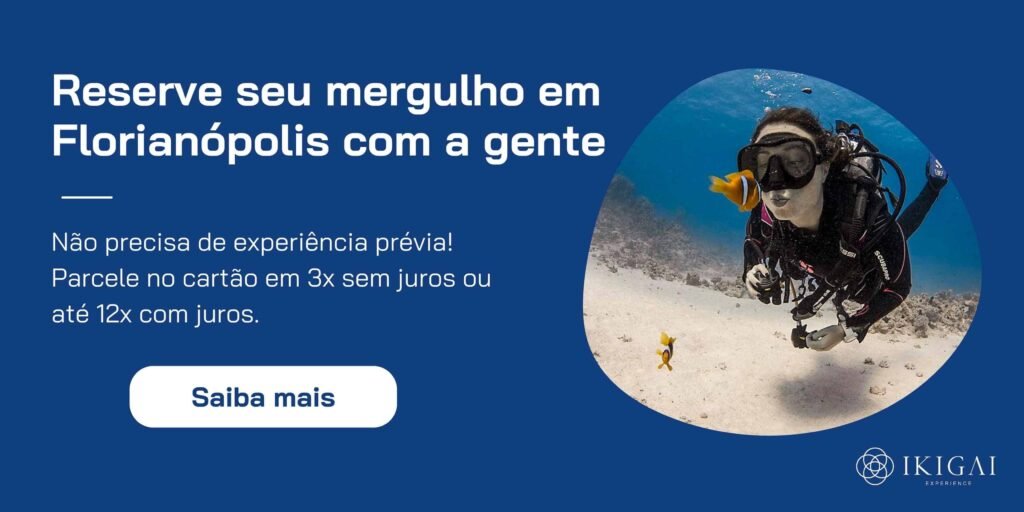
4.3 Diving in the sea
The course concludes with a dip in the sea. The school is responsible for organizing the event and taking care of every detail.
In this last stage, the student continues to receive the support of the instructors, who will pass on the techniques that were taught in the pool.
The courses have a duration that can vary between 3 to 5 days, depending on the diving school and the teaching facilities.
At the end of the course, he will receive a certificate, guaranteeing his total ability to practice the activity anywhere in the country and the world, without the need to be accompanied by an instructor.
Once you complete the full course, you can dive anywhere in the world as an accredited person!
Diving tips for beginners
Now that you are practically familiar with the world of diving, it is time to conclude this content with the most important tips for beginners in the practice of this activity.
Pay special attention to each one, they are valuable tips that really make a difference when put into practice. But don't worry too much now, your instructor will go through them all again on the day of your dive. Check out!
1. relax
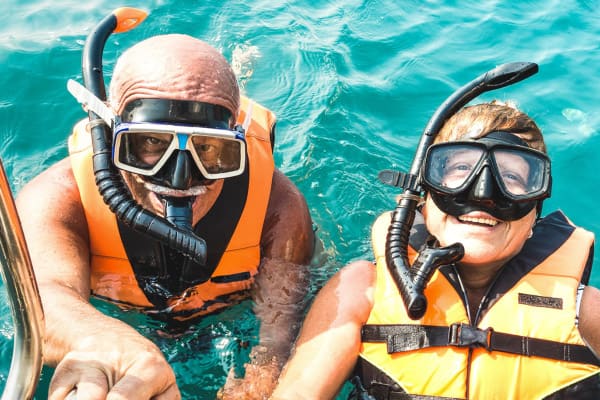
The first tip seems obvious, however, it is surprising how many people end up harming the moment of diving due to nervousness and anxiety.
And the tension is justifiable, after all, the novice diver will jump, for the first time, in an environment totally foreign to him.
Not to mention the rubber suit that keeps squeezing the body, in addition to the other diving equipment that end up bothering and causing discomfort.
However, circumstances cannot be reasons to be anxious and tense, after all, remember that you will be taking the first step towards a magical and impactful world.
Also, remember that you will be guided by a trained and certified instructor.
So, you don't have to worry, as the instructor will be helping you along the way, preventing you from drowning.
Before diving, try to entertain yourself with what you like, whether listening to good music, watching fun videos or even having good conversations with your companions.
Also know that many divers have the habit of doing meditation before diving, which is a good option if you like it, isn't it?
In short, all this preparation for relaxation will ensure that the experience is lived with more intensity.
2. Don't hold your breath
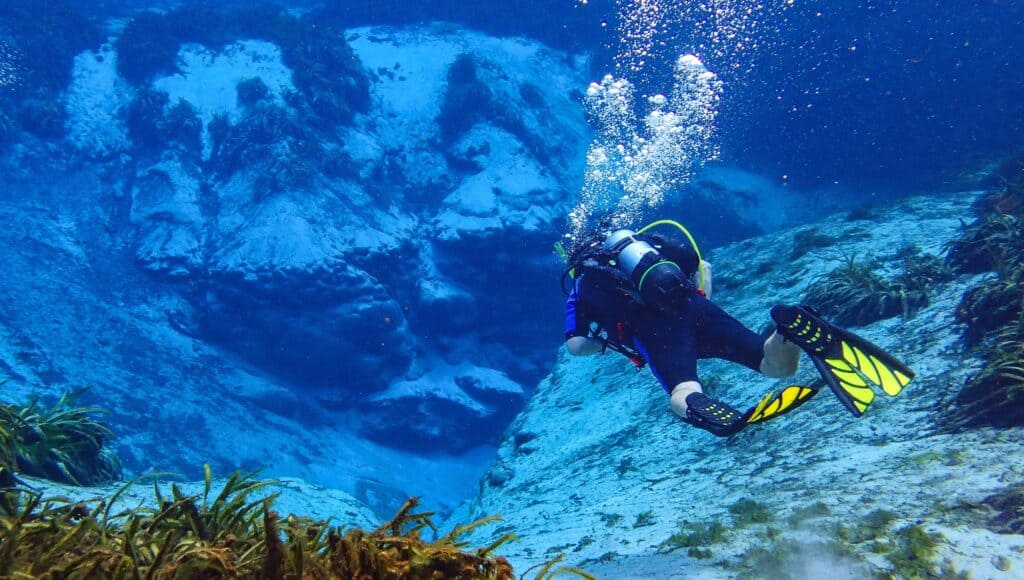
Another key tip is not to hold your breath. To avoid this, try to blow a constant stream of bubbles when you don't have the regulator in your mouth.
Then insert the regulator and breathe normally and continuously.
3. Make your ears equalized
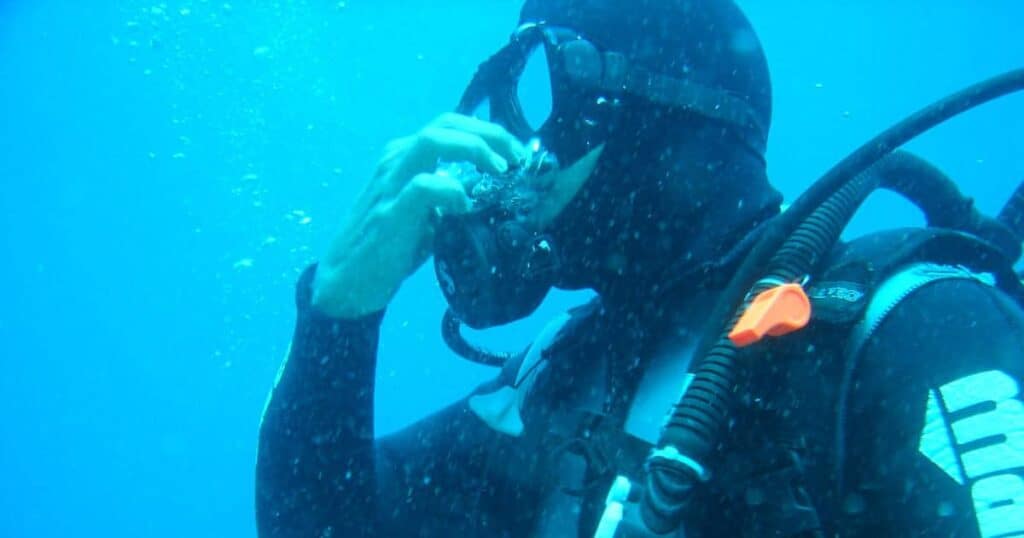
When you are diving and going down to the sea floor, it is necessary to equalize your ears because of the water pressure.
The equalization is done very simply: you must, with your mouth closed, block your nose and blow until you feel both ears pop.
4. Cleaning the diving mask during the course
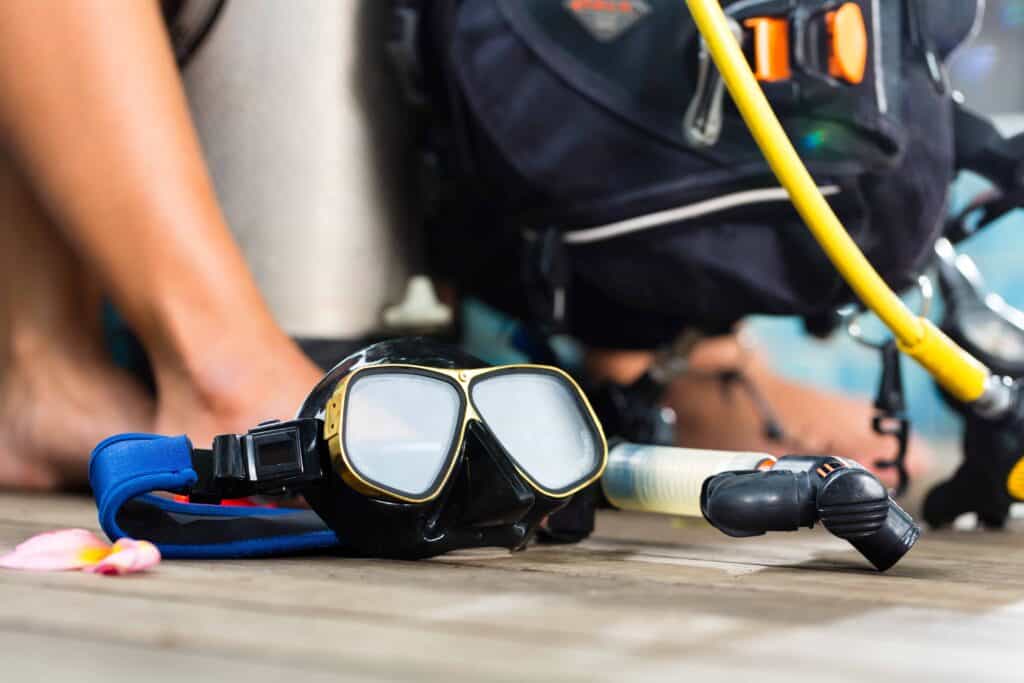
when talking about diving for beginners, it is essential that the practitioner acquires 3 major skills.
The first one is that you are able to clean your mask when a little water gets inside.
In addition, in cases where the mask becomes cloudy, the diver must let a little water enter the mask and then clean it.
The second skill is cleaning the regulator and keeping your mouth hydrated.
When diving is practiced at sea, it is common for the mouth to become dry, in which case the diver must remove the regulator, allow some water to enter the mouth, expel it and, finally, put the regulator back on.
And remember: never hold your breath when removing the regulator, right?
The third and final skill that the diver must have refers to the neutralization of buoyancy. You must be wondering what this is and how to do it, right? But don't worry, everything will be explained below.

As long as you are on the surface and in the balance vest, you will be positively dynamic and thus will float.
However, as you dive, you will release the air from the buoyancy vest and begin to descend, requiring some air to be added to neutralize buoyancy.
5. Practice diving in places suitable for beginners and with professionals who value quality
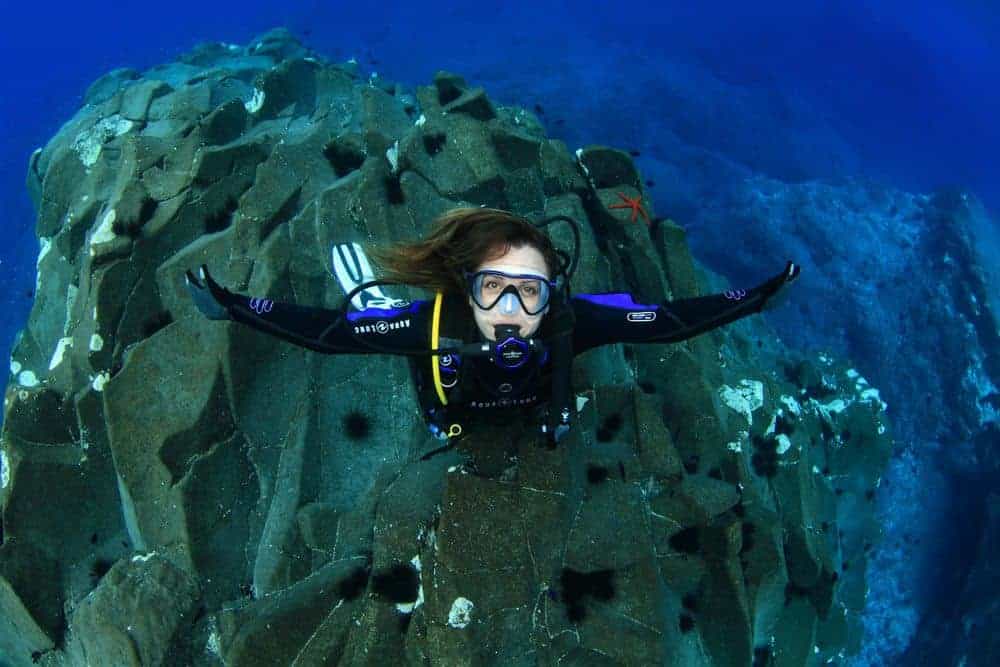
There are thousands of places that are perfect for your first dive. Generally, these are places where the water depth is less, the visibility is good and more extensive and the space does not have many obstacles that pose a risk.
Seek to know and research about the diving point you are going to dive and meet the professionals who will perform the dive with you.
Operators that operate with quality, always value the best experience for the diver, especially beginners, and may even refuse to serve them on days of inadequate conditions.
After all, any stress factor can be enough to make the experience not pleasant and make the beginner not want to dive anymore.
Here at Ikigai Experience, we hand-selected our partners and dive spots, always seeking to offer beginners a guaranteed fun experience.
6. Try not to touch anything
The marine world can be full of surprises, and it is important for the diver to experience the experience only through observation, which is enough to be enchanted by the beautiful landscapes and species of animals that inhabit the depths of the sea.
In addition, as divers, we always seek not to interfere with marine life, there is no better experience and feeling than the simple feeling of coexistence in this other world that is the bottom of the sea.
In the last case, if I do, I do it with care and attention and respect for the marine fauna and flora.
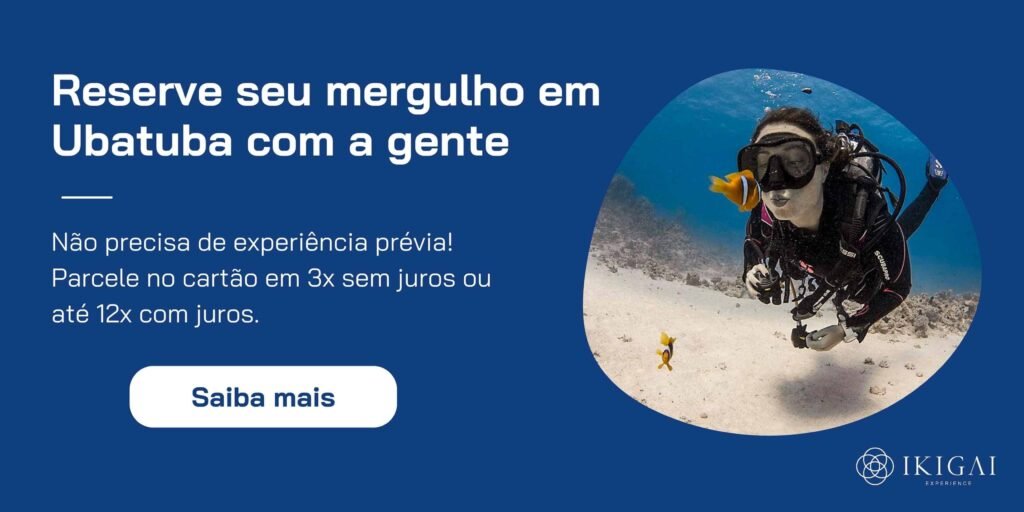
7. Pay attention to health status and precautions
the last tip of diving for beginners is related to a previous health assessment. Even if calm, diving remains a sport and requires minimal health conditions.
It should be avoided by anyone experiencing fainting, dizziness, colds, diabetes, nasal congestion, asthma, sinusitis, tuberculosis, hypertension, respiratory or heart problems.
If you have respiratory problems, sinusitis or other serious illnesses that compromise your health, it is essential that they are properly cared for before diving.
For example, in the case of a practitioner with sinusitis, a depth of more than 5 meters is enough for the ears to be pressed, a fact that can cause discomfort and pain.
In addition, this type of diving should not be practiced by pregnant women and people with emotional disorders, claustrophobia or who have undergone recent operations.
Thus, it is important that you do not compromise your first dive, and should only be performed when the health status is 100%.
Dive completion for beginners
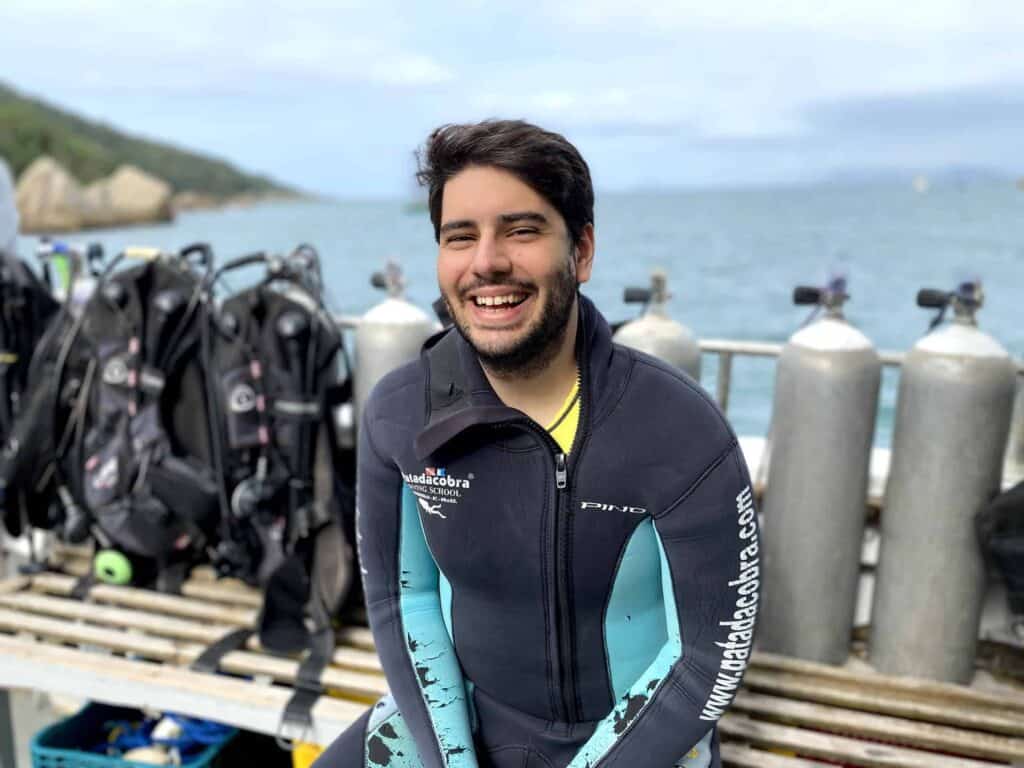
With this comprehensive guide to diving for beginners, you are 100% prepared to face the bottom of the sea, one of the most fantastic and incredible environments in the world, without a doubt.
We invite you to discover Ikigai Baptism Dives and have that first fascinating experience with us.
Wanna go diving?

